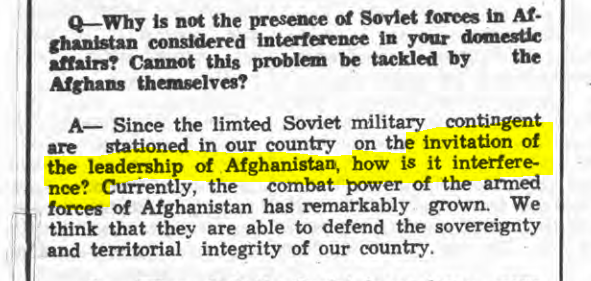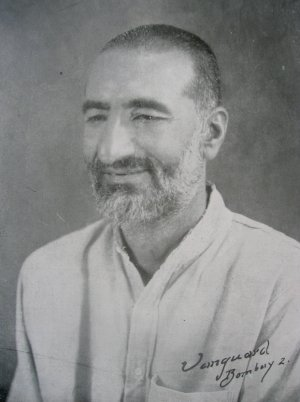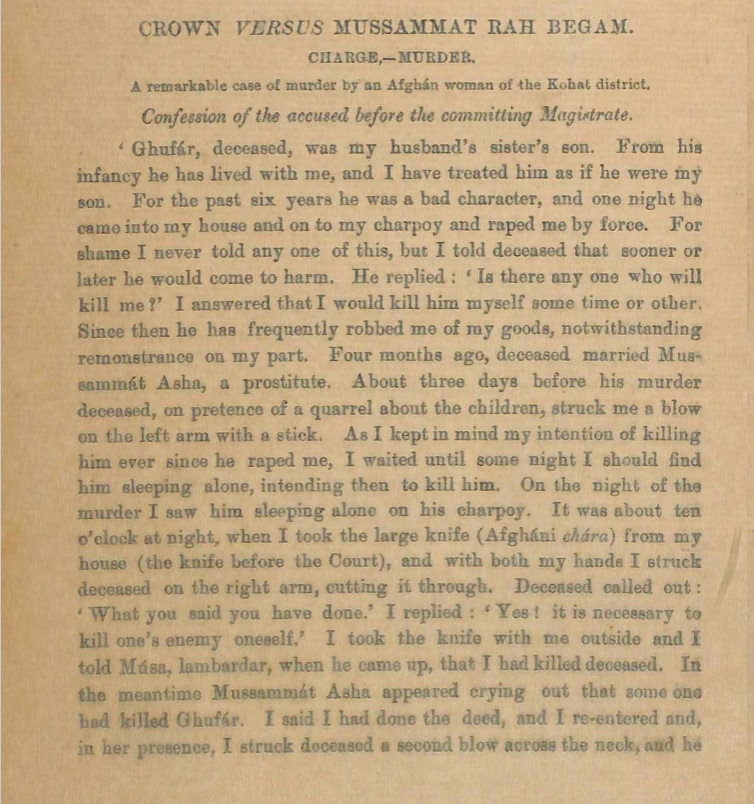
Islamia College Lahore, built with the support of Afghanistan, played an instrumental role in the educational uplift of the Muslims of Punjab, and by extension, served as the base camp for the movement of Pakistan.
#Thread #History

#Thread #History


In late 19th century, the initiatives to educate Muslims with the Islamic as well as modern education were taking shape in India including in Punjab. Among such initiatives was the establishment of the ANJUMAN HIMAYT-E-ISLAM PUNJAB by Munshi Chiragh Din in 1884.
This was partly in response to the expulsion of Ghiragh Din from a gathering where a Christian missionary said some unfair words regarding Prophet Muhammad (PBUH).
The Anjuman would collect donations from Muslims and use it for education and in publication of religious works,
The Anjuman would collect donations from Muslims and use it for education and in publication of religious works,
serving the Muslim population. One of the initial achievement of the Anjuman was the establishment of Islamia College in 1892 in Lahore. There were about 7 students initially but then the number grew over time.
With the govt regulations regarding the educational institutes and universities, there was a need for a purpose-built building that would cater for more students, but an institution run merely on donations couldn’t afford to do that.
The principal of the college during the early years was Chaudhry Nabi Baksh. Chaudry Nabi Baksh was the brother of Chaudry Sultan Mohammad Khan who was serving the Amir of Afghanistan in various roles and had become his Chief Secretary.
I wrote a brief thread on Sultan Mohammad Khan earlier, if you want you may read it below.
https://twitter.com/NafeesRehmanDr/status/1064111096309710849?s=20
Chaudry Nabi Bakhsh suggested to his brother that he introduce Islamia college to the Amir and get his support for it. It was Chaudry Nabi Bakhsh who also played a role in introducing Dr. Abdul Ghani to the Amir and his officials.
An earlier brief thread on Dr. Abdul Ghani.
https://twitter.com/NafeesRehmanDr/status/1073975692184948739?s=20
In 1895, when Prince Nasrullah Khan of Afghanistan was going to London, he stayed at Lahore for short stay. When the Anjuman approached him for support, he graciously gave them Rs.1000 and then again Rs. 3000/. 

The Anjuman wanted to collect donations from the Afghans. Sardar Ismail, the Afghan ambassador at Lahore paid, a visit to the college in 1898-99 and promised his personal as well as Afghanistan’s financial support. He also did make private contribution on his visit.
By 1902, Afghanistan had committed an annual financial contribution of Rs. 2000/ and in addition to it, sometimes separate donations from the royals would also come. The same year Amir Habibullah Khan made Rs. 3000/ contribution.
This annual donation increased over the years and reached Rs. 6000/. It was, mostly, with this financial assistance that about 50 Kanals of land for Rs. 50,000/ was purchased in 1906 at Lahore for the construction of a new building for the college.
When Amir Habibullah Khan visited India on two months long visit in January 1907, the Anjuman planned to invite the Amir to lay the foundation stone of the college. 
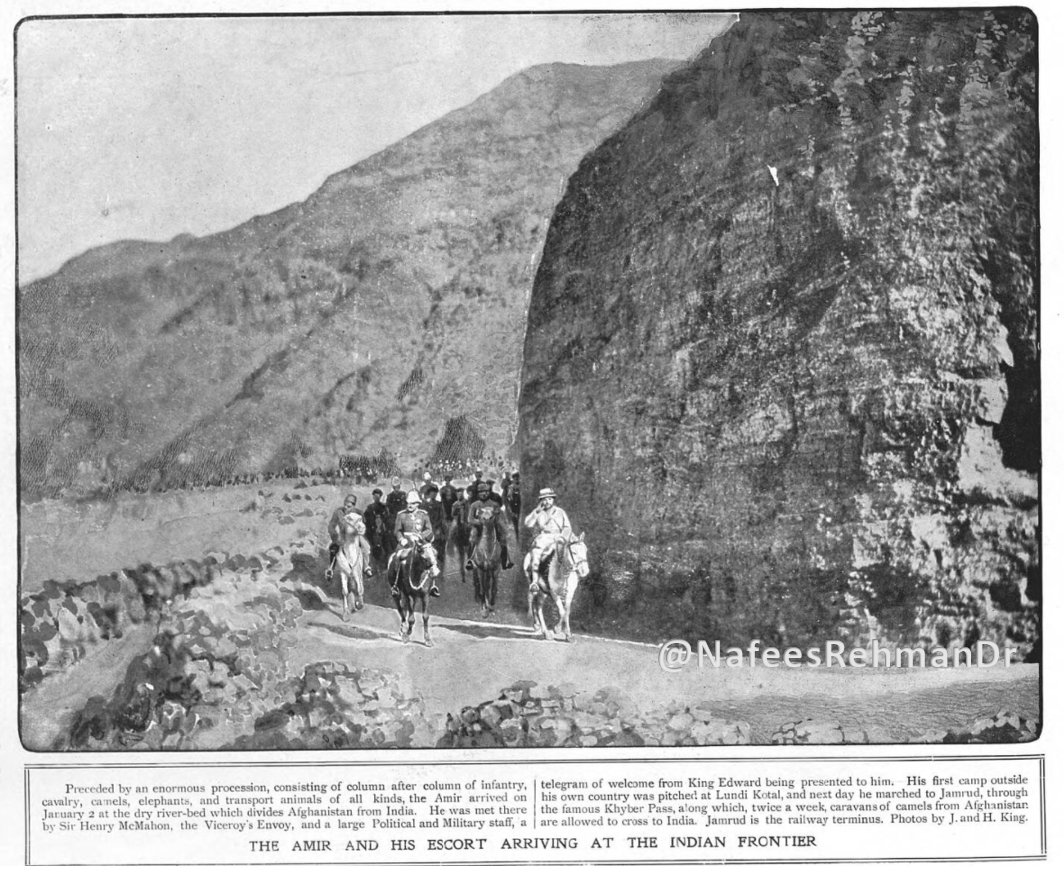
They sent their team to welcome the Amir at Peshawar but it was agreed that the upon the return journey of the Amir from Bombay to Afghanistan would he come to Lahore and lay the foundation stone.
Photo Source: The Graphic Feb 2, 1907.
Photo Source: The Graphic Feb 2, 1907.

The Amir came to Lahore on March 1st 1907. Besides the British govt arrangements, the Anjuman and the Muslim population made special arrangements, erected two special gates to welcome the Amir and decorated the roads he passed through. 

On March 3rd 1907, a large number of people gathered to attend the ceremony of laying the foundation stone of the new building and to listen to the speech of Amir Habibullah Khan.
The Amir was warmly received and a welcome address a delivered in his honor.
The Amir was warmly received and a welcome address a delivered in his honor.
It was also presented in a beautiful silver casket to him. In reply, the Amir made a short but excellent speech and laid the foundation stone.
Here is a photo of him on the occasion.
Photo via Safia Haleem.
Here is a photo of him on the occasion.
Photo via Safia Haleem.

The Amir also announced to increase the annual donation from Rs. 6000/ to Rs. 12,000/, and in addition presented Rs. 20,000/ to the college fund. He regretted that he couldn’t not make a larger contribution and gave the reason that he was establishing educational institutions
across Afghanistan, and the claims of his country come first.
Amir Habibullah Khan stressed the seeking of western knowledge. He said “There are those who declaim against Western sciences as against evil. I am not among them. On the contrary, I say pursue knowledge everywhere but remember that science is the superstructure of religion.”
The speech of Amir Habibullah Khan, posted in full.
Source: The Greenock Telegraph and Clyde Shipping Gazette March 5, 1907.

Source: The Greenock Telegraph and Clyde Shipping Gazette March 5, 1907.

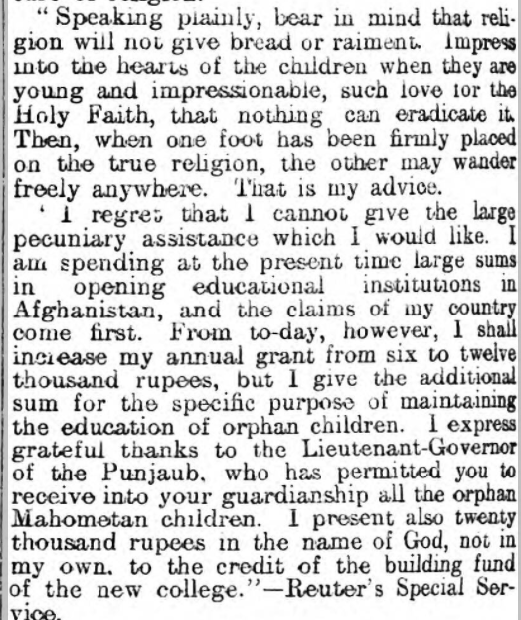
The construction of the building was completed by 1912 and the classes was shifted there that year. The graduates of the college were used to be called Habibian.
The students of the college played crucial roles in the world in different fields in the coming years, specially tended to support Muslims.
The single biggest chunk of students who went to support the Turks, the Caliphs, came from this college in 1915.
The single biggest chunk of students who went to support the Turks, the Caliphs, came from this college in 1915.
Islamia college and its students played a central role in the Pakistan movement. It was at this college that the Lahore resolution was termed as Pakistan Resolution in 1941.
Its students served as body guards of Quaid-e-Azam M.A. Jinnah and were the front line soldiers the Pakistan movement. Of 14 visits to Lahore, Jinnah came to Islamia college about 11 times. 

Bibliography (Incomplete):
1. The Indian Muslims' Services To Afghanistan (1880s-1930s) by Noor-ul-Amin, University of Peshawar,
2. Safia Haleem (safiahaleem.com/?p=5015&fbclid…)
3. Govt College website (gicrr.edu.pk/about/history/)
**Sources have been provided with the photos already**.
1. The Indian Muslims' Services To Afghanistan (1880s-1930s) by Noor-ul-Amin, University of Peshawar,
2. Safia Haleem (safiahaleem.com/?p=5015&fbclid…)
3. Govt College website (gicrr.edu.pk/about/history/)
**Sources have been provided with the photos already**.
• • •
Missing some Tweet in this thread? You can try to
force a refresh




